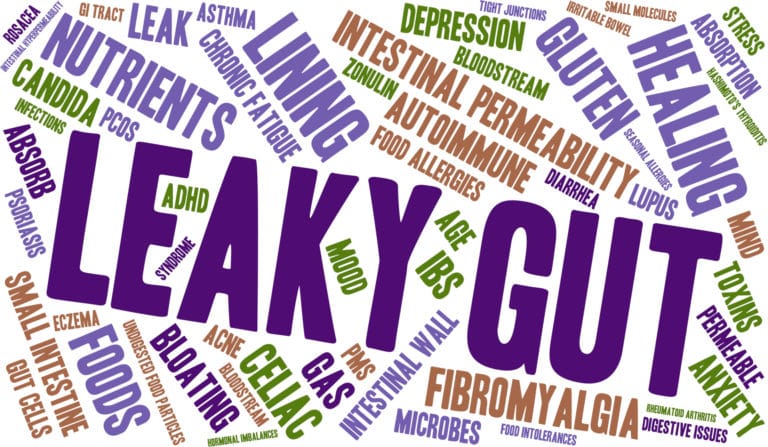You may have heard the term, “You are what you eat,” correct? Even the father of modern medicine, Hippocrates, claimed: “All disease begins in the gut.” So, what exactly does your stomach or other digestive organs have to do with anything besides telling you to feed it?
Well, it turns out… A LOT. Because you AREN’T just what you eat…you are what you eat, digest, and absorb and your overall health depends a lot on how well your gut is working. Last week, I began a series on gut health (because it is intimately related to hormones…more on that next week). The first article was about SIBO (you can read about that here) and this week, I’m focusing on leaky gut.
What is Leaky Gut?
Another name for leaky gut is intestinal permeability. Many physicians don’t believe this is a “thing,” but trust me, it is. When all is working well, tight openings in the intestinal walls allow water and nutrients to pass through into the bloodstream while keeping harmful substances inside. In leaky gut syndrome, these openings become wider allowing food particles, bacteria, and toxins to enter directly into the bloodstream. This sets up a host of symptoms you don’t want such as:
- Chronic diarrhea, constipation, or bloating
- Nutritional deficiencies
- Fatigue
- Headaches
- Confusion
- Difficulty concentrating
- Skin problems, such as; acne, rashes, or eczema
- Joint pain
- Widespread inflammation
Ultimately, this can lead to an increased likelihood of:
- Thyroid disorders
- Allergies/food sensitivities
- Small Intestine Bacterial Overgrowth (SIBO)
- Irritable bowel syndrome (IBS)
- Celiac disease
- Metabolic diseases
- Autoimmune diseases
Keep in mind that although these diseases are shown to have an association with the leaky gut syndrome, they are not caused by the leaky gut syndrome. Scientific evidence thus far strongly suggests that leaky gut and other dysfunctions occur at the same time.
Why Should a Leaky Gut Concern You?
Many health experts, myself included, agree that health begins in your gut. A combination of poor diet choices, chronic stress, toxic overload, and bacterial imbalance can start to wreak havoc on your body without any obvious signs. Eventually, it all adds up and symptoms appear.
About 75-80% of your immune system exists in your gut. When you have a leaky gut, certain particles make their way into your bloodstream that should not be there. This leads to widespread inflammation and starts an immune reaction. This, in turn, is what causes disease. A leaky gut can also affect the gut’s ability to produce neurotransmitters, the majority of which are also made in the gut.
Think you might be suffering from leaky gut issues? There are a number of different ways to find out.
[bctt tweet=”Think you might be suffering from leaky gut issues? Click to read more! #leakygut #stooltest #foodintolerance #inflammation #gutmicrobes #stresshormones #neurotransmitters #zonulin #mindfuleating #AnnaGarrettAsheville #DrAnnaGarrett” username=”DrAnnaGarrett”]
How to Test for Leaky Gut Syndrome
Testing for leaky gut syndrome can be done in a variety of different ways.
1. Zonulin Test
Zonulin controls the size of the openings between your gut lining and your bloodstream. Even in healthy people, small openings are needed between the two to transport nutrients back and forth, but abnormally high levels of zonulin can cause these openings to become too large. This can be detected in a serum or stool test.
2. IgG Food Intolerance Test
It’s important to identify any food sensitivities you have if you think you have leaky gut since most people who have leaky gut wind up developing sensitivities as a result — and ignoring these can make the condition even worse.
While some food sensitivities or reactions are obvious, others are more subtle and can easily go unnoticed, since they produce low-grade systemic inflammation. This becomes dangerous over time and can cause a range of inflammatory diseases, so removing food sensitivities is critical to getting leaky gut under control. You can learn more about food sensitivity testing here.
3. Stool Tests
A stool test (like GI Map) looks at beneficial bacteria levels, the state of intestinal immune function, overall intestinal health, and inflammation markers.
Additionally, fecal matter can reveal probiotic levels along with good and bad microbes. It also gives information about any pathogenic micro-organisms, such as; yeast, parasites, and bacteria that might contribute to leaky gut, chronic illness, and neurological dysfunction (like mood changes or “brain fog”).
Learn more about my GI Map program here.
4. Organic Acid Vitamin and Mineral Deficiencies Tests
Leaky gut results in nutrient malabsorption or vitamin/mineral deficiencies. This occurs because of damage to the gut that allows large particles to pass through the gut lining that shouldn’t (like gluten) and for some small molecules to be blocked that are actually meant to pass through and provide nutrients.
An organic acid test looks for vitamin and mineral deficiencies, amino acid (protein) deficiencies, information in regard to protein, fat, and carbohydrate metabolism, and antioxidant and bacteria levels.
An organic acid test is a urine test that is done at home.
How to Improve Gut Health
There are a number of ways you can take your gut health into your own hands. One of the biggest things you can control is what you put in your mouth. There are many different eating plans out there that are beneficial for digestive health.
Foods to Include:
- Vegetables: broccoli, cabbage, carrots, spinach
- Roots and tubers: potatoes, sweet potatoes
- Fermented vegetables: sauerkraut, tempeh, or miso
- Gluten-free grains: buckwheat, rice (brown and white)
- Healthy fats: avocado, coconut
Foods to avoid:
- Wheat-based products: white bread, pasta, cereals
- Gluten-containing grains: wheat, barley, rye, spelt
- Processed meats: cold cuts, deli meats
- Baked goods: cakes, muffins, cookies
- Dairy products: milk, cheese, and ice cream, etc.
It’s also important for medications that damage the gut lining and microbiome like NSAIDS, birth control pills, proton pump inhibitors, metformin, and antibiotics (to name a few).
And last, stress management is tremendously helpful. Stress affects digestion and the nutrients the intestines absorb. It also leads to the weakening of the intestinal barrier as mentioned above. Mindful eating is a strategy that can help lower stress while improving nutrient absorption. If you’d like to learn more about this, I highly recommend The Slow Down Diet by Marc David.
Dr. Anna Garrett is a menopause expert and Doctor of Pharmacy. She helps women who are struggling with symptoms of perimenopause and menopause find natural hormone balancing solutions so they can rock their mojo through midlife and beyond. Dr. Anna is the author of Perimenopause: The Savvy Sister’s Guide to Hormone Harmony. Order your copy at www.perimenopausebook.com.
Dr. Anna is available for 1-1 consultations. Find out more at www.drannagarrett.com/lets-




